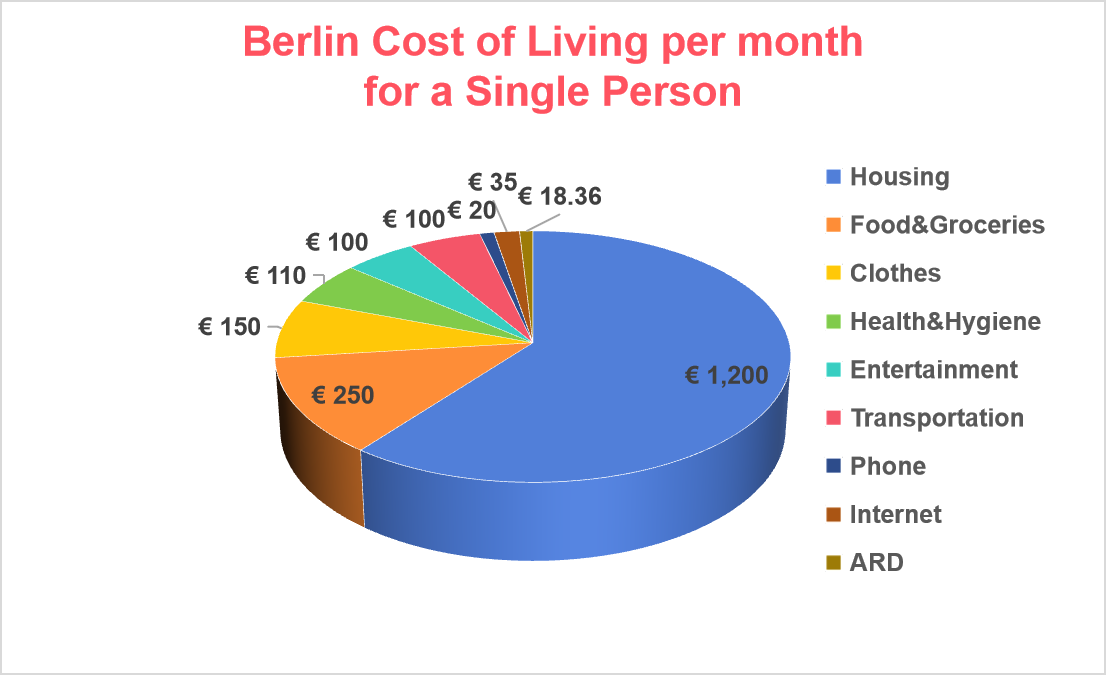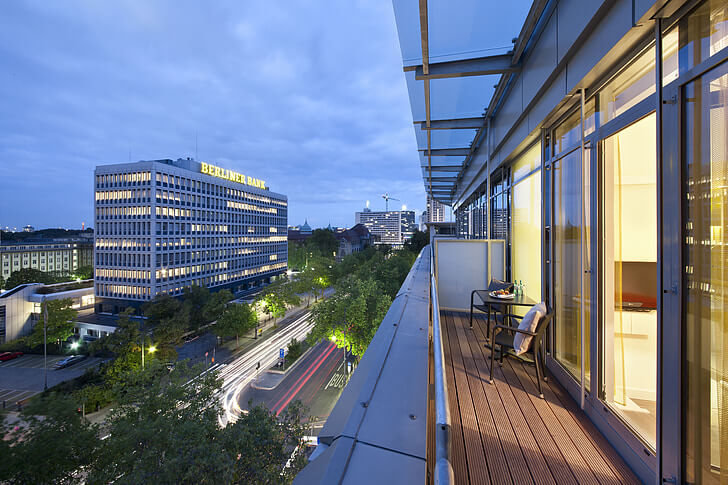What is the cost of living in Berlin? If you’re going to study or work in Berlin and stay there for a long time, you might worry about the living expenses. The question is: Can I afford the living expenses in a metropolitan city on the Spree? The answer is, YES, when compared to other big cities in Germany and Europe. Today let’s take a closer look at the cost of living in Berlin.
What Is the Cost of Living in Berlin?
Before we start, let us firstly clarify the definition of cost of living. The term cost of living (in German “Lebenshaltungskosten”) describes the general living expenses of an individual or family. In short, living expenses are all the money you spend on the necessities of life.
So what counts as the cost of living in Berlin? For example, your housing, food, hygiene products, internet, and also leisure activities and sports. Strictly speaking, insurance and social security contributions (such as pension or liability insurance) are not included.
Cost of Living in Berlin: General Overview
1️⃣ For a Single Person
The average cost of living in Berlin for a single person is about €2,000 per month. Compared to other big cities in Europe, it’s really affordable! Almost the cheapest capital to live!
The following table summarizes a single person’s average cost of living in Berlin. Of course, the actual expenses will vary, as everyone’s needs and consumption habits are different. In addition, the cost of raising children, education investment, and purchasing additional insurance will also have an impact on the expenditure.
| The Average Cost of Living in Berlin for a Single Person per Month | |
|---|---|
| Item | Average Cost |
| Housing | € 1,200 |
| Food&Groceries | € 250 |
| Clothes | € 150 |
| Health&Hygiene | € 110 |
| Entertainment | € 100 |
| Transportation | € 100 |
| Phone | € 20 |
| Internet | € 35 |
| ARD | € 18.36 |
| Total | € 1,983 |

According to the table above, the biggest expense is housing rent, followed by food and groceries. Rents in Berlin have risen sharply in recent years, making it one of the most expensive cities in Germany (still cheaper than Munich).
⭐️ It is worth noting that if you’re working in Berlin, the taxes, insurance and pension will be taken from your gross income. You’ll get the net income after the social contribution is taken. The average salary in Berlin is about €3,000 after tax. You can save some money for travel or emergency, if you plan your wallet well.
2️⃣ For a Family
| The Average Cost of Living in Berlin per Month for a Family | |
|---|---|
| Item | Average Cost |
| Housing | €2,000-€2,500 |
| Food&Groceries | € 500 |
| Clothes | € 200 |
| Health&Hygiene | € 400 |
| Entertainment | € 100 |
| Transportation | € 200 |
| Phone | € 40 |
| Internet | € 40 |
| ARD | € 18.36 |
| Education & Daycare | € 200 |
| Total | €3,698-€4,198 |
The average cost of living in Berlin for a family with children in Germany is about €4,000. Rent is still the most expensive expense among them. In addition, because of the children, the expenses for food, shopping, and education will be much higher!
If you have children, you may need to plan your financial expenses more carefully. Fortunately, the German government will give families a certain amount of subsidies for the birth and education of children, which can alleviate the financial pressure on couples to some extent.
Cost of Living in Berlin: Housing

Although rent in Berlin is relatively cheap compared to other major cities, it will still be the biggest expense in your living costs.
The concrete rent prices in Berlin vary depending on the location, property types, room facilities, providers/landlords, and some other factors. For example, when you want to live near one of the major universities, transportation lines, or in the city centre, you need to pay more money for accommodation. Besides, whether utility bills are covered in your rent also impacts your rent.
Here is a comparison of the average rents for common housing types in Berlin:
| Accommodation Type | Average Rent in Berlin |
|---|---|
| Private Room | €800-€900/month |
| Shared Room | €400-€500/month |
| Studio Apartment | €1,200/month |
| 1-bedroom Apartment | €1,700/month |
When you’re looking for apartments for rent in Berlin, it’s important to understand the difference between cold rent (Kaltmiete) and warm rent (Warmmiete). The warm rent includes utilities (Nebenkosten).
| Additional Costs & Utilities | |
|---|---|
| Item | Price |
| Heating and Hot Water | Usually included in your warm rent (Warmmiete). |
| Electricity and Gas | €45 – €70 per month |
| Internet (100 Mbit/s) | €35 per month |
| TV tax (ARD) | €18.36 per household per month |
| Mobile Phone | €7 to €40 per month |
📺 Even if you don’t watch TV or listen to the radio, you must pay TV tax (Rundfunkbeitrag) every month. It’s not really a kind of “tax” but a public broadcasting fee in Germany. Every household must pay for it. If you live in a house share in Berlin, you can split the cost with other tenants. A TV tax invoice will be sent to you by post every 3 months. You can pay manually by bank transfer or automatically by debit authorization.
Cost of Living in Berlin: Groceries&Food

Groceries in Berlin are pretty affordable in Berlin. On average, a single person spends around €250 per month on groceries. Families will need to double or triple that, depending on the size of their household.
🥂 Eating Out
Whether you want to have a nice dinner with friends, grab a quick bite, or just enjoy a cup of coffee, Berlin has plenty to offer.
| Restaurants | Price |
|---|---|
| Meal, Inexpensive Restaurant | € 15 |
| Meal for 2 people | € 70 |
| McDonalds | € 11 |
| Domestic Beer (1 pint draught) | € 4.5 |
| Imported Beer (12 oz small bottle) | € 4.0 |
| Cappuccino | € 3.5 |
| Coke/Pepsi (12 oz small bottle) | € 2.8 |
🥦 Cooking by Yourself
It’s more cost-effective and healthy to cook meals on your own. Compared to other European big cities like Amsterdam and London, food prices in Berlin are relatively affordable. Below you can see some basic food prices:
| Groceries | Price |
|---|---|
| Water (12 oz small bottle) | € 2.6 |
| Milk (1 gallon) | € 4.2 |
| Fresh White Bread (1 lb) | € 1.9 |
| Rice (1 lb) | € 1.3 |
| Eggs (12) | € 3.1 |
| Local Cheese (1 lb) | € 5.7 |
| Chicken Fillets (1 lb) | € 6.0 |
| Apples (1 lb) | € 1.2 |
| Banana (1 lb) | € 0.7 |
| Oranges (1 lb) | € 1.0 |
| Tomato (1 lb) | € 1.5 |
| Potato (1 lb) | € 0.8 |
| Onion (1 lb) | € 0.8 |
| Lettuce (1 head) | € 1.7 |
| Bottle of Wine (Mid-Range) | € 6.0 |
Cost of Living in Berlin: Transportation

Berlin is very famous for its well-connected and convenient transportation system. With a valid ticket, ticket holders can travel on all public transport in Berlin, including the S-Bahn, underground, buses, trams, and ferries. The concrete fare depends on the fare zone and the ticket validity period.
Berlin is divided into three fare zones: AB, BC, and ABC. Fare zone AB covers the city center of Berlin as well as the city’s border areas. Fare zone ABC also includes the surrounding areas of Berlin, BER Airport, and Potsdam Central Station.
| Ticket Type | Ticket Fares | |
|---|---|---|
| Single Ticket (Einzelfahrschein) | Fare zone AB | €3,50 (regular), €2.20 (reduced) |
| Fare zone BC | €4 (regular), €2.70 (reduced) | |
| Fare zone ABC | €4.40 (regular), €3.20 (reduced) | |
| Short Trip Ticket (Kurzstrecke) | €2,40 (regular), €1.90 (reduced) | |
| Tariff for Children | up to the age of five | free |
| 6 to 14 years | reduced fare ticket | |
| 24-Hour Single Ticket | Fare zone AB | €9.90 (regular), €6.50 (reduced) |
| Fare zone BC | €10.40 (regular), €6.80 (reduced) | |
| Fare zone ABC | €11.40 (regular), €7 (reduced) | |
| 24-Hour Group Ticket | Fare zone AB | € 31 |
| Fare zone BC | € 32 | |
| Fare zone ABC | € 33 | |
| 7-Day Single Ticket | Fare zone AB | € 41.50 |
| Fare zone BC | € 42.50 | |
| Fare zone ABC | € 49 | |
| School student monthly ticket | € 71.40 | |
| Monthly ticket | € 99 | |
| Taxi | ||
| Initial charge | € 4.30 | |
| Charge per kilometre for the first three kilometres | € 2.80 | |
| Charge per kilometre ffrom three to seven kilometres | € 2.60 | |
| Charge per kilometre from the seventh kilometre | € 2.10 | |
| Waiting period | € 39 Euros per hour | |
| Drive | ||
| Gasoline (1 gallon) | € 6.83 | |
For most of the people living in Berlin, the monthly pass is the best choice. If you live not far from your school or work, riding a bicycle is also highly recommended. It can save more money and is more environmentally friendly and healthy.
Cost of Living in Berlin: Daily Life

Berlin is a good place full of fun and various nightlife. So in addition to the necessary expenses, you also need to set aside a portion of your budget for entertainment, such as parties, fitness, shopping, travel, etc. When having children, the cost of living in Berlin for a family of 3 or 4 can be much higher.
| Sports&Leisure | |
|---|---|
| Item | Price |
| 🎬 Cinema, 1 ticket | € 12.65 |
| 🏋 Fitness Club, Monthly Fee for 1 Adult | € 34.77 |
| ⚾ Tennis Court Rent (1 Hour on Weekend) | € 22.35 |
| 🏫 Museum tickets | € 10.00 |
| Childcare | |
| Item | Price |
| Preschool (Kindergarten), Full Day, Private, Monthly for 1 Child | € 251.88 |
| 1 Pair of Jeans | € 82.48 |
| 1 Summer Dress in a Chain Store | € 36.59 |
| 1 Pair of Nike Running Shoes | € 88.31 |
| 1 Pair of Men Leather Business Shoes | € 125.96 |
Cost of Health Insurance in Berlin
Health insurance is a big expense, but it is something you must have when living in Germany. If you work in Germany, 7.3% of your salary will be deducted every month to pay for health insurance. Your employer will pay the other half. Students can choose to purchase private or public health insurance, which costs between €90 and €150 per month.
| Public health insurance fee structure | ||
|---|---|---|
| Item | Monthly cost | coverage area |
| Basic Premium | about €90 | ambulatory treatment, medicines, etc. |
| Additional charged item | / | |
| Private health insurance fee structure | ||
| Item | Monthly cost | coverage area |
| Basic Premium | From €150 | ambulatory treatment, superior ward, dental department, etc. More non-basic needs covered. |
| Additional charged item | Varies depending on the plan | |
Cost of Living: Berlin VS. Other Major European Cities
Berlin VS. Munich
The average cost of living in Munich is 15.8% higher than in Berlin, despite higher incomes. With a few exceptions like fresh food, almost everything is more expensive in Munich. If you want to rent an apartment in Munich, you may need to increase your budget by 45%.
Berlin VS. London
Living in Berlin is much cheaper than living in London. The cost of living in London is 34% higher than in Berlin. Rent in London is more than double that in Berlin, and if you want to buy an apartment, you will pay 134% more than in Berlin! In London, eating out in restaurants also costs 59% more. Although both cities have a well-functioning public transport system, you’ll pay 110% more for buses and trains by the Thames than by the Spree, and 50% more for taxis.
Berlin VS. Paris
Paris is also more expensive overall than Berlin, with an average cost of living 25% higher. The main reasons are that housing costs 50% more than in Berlin, and food costs 20-40% more than in Berlin. In addition, eating out around the Eiffel Tower costs 30% more. In Paris, only public transportation is up to 50% cheaper.
How to Save Money in Berlin

In addition to the cost of living in Berlin mentioned above, you also need to pay for your taxes, health insurance, and pension contributions every month (if you work in Germany). How to save some money when living in Berlin? Here is some advice about how to manage your costs.
Do's
- Take Public Transportation: By taking public transportation, you can save a lot of money on car maintenance, gas, parking fees, etc. Or you can ride your bike to get around, which is even cheaper.
- Rent a house share: The private accommodation in Berlin is pretty expensive, especially in the city centre. Looking for a flatshare or moving to a cheaper neighborhood can be a good choice. If you’re studying in Berlin, you can save rent by booking student accommodation in Berlin, which provides a comfortable, convenient, and safe living environment at an affordable price.
- Cook more often: It’s okay to dine out occasionally. But if you go to restaurants or order takeout frequently, it can add up to be much more expensive than buying the ingredients and cooking for yourself!
- Consider second-hand options: Germany has a very developed second-hand market. By purchasing second-hand products, you can save a lot of unnecessary expenses.
Dont's
- No budget plan and no savings: It is important to plan your budget well, and even set aside a separate emergency fund. Control yourself and don’t touch this money, unless something unexpected happens.
- Ignore The Exchange Rate When Spending: If you’re an international student, especially when from a developed country, don’t forget to convert the Euro prices into your own country’s currency. Carefully compare the prices and don’t be fooled by the “cheap” Euro prices.
Conclusion
There is no doubt that the cost of living in Berlin is more affordable compared to other European metropolises. However, the population of areas such as Charlottenburg and Mitte is rising steadily and rapidly (around 40,000 people per year). So is the cost of living in these areas (mainly due to rising housing prices). Even so, Berlin’s high-quality education and vibrant city life continue to attract large numbers of people. Make a detailed budget plan before coming to Berlin so you can live more comfortably
FAQ
Is it expensive to live in Berlin?
The average cost of living in Berlin is lower than other big cities, such as Munich, Paris, London, and more. A single person costs less than €2,000 per month. A family of 4 costs about €4000 every month.
Is it cheaper to live in London or Berlin?
The average cost of living in Berlin is much lower than in London. The average monthly cost of living in London is about £2,550 (€3070.30) for a single person and around £4,400 (€5297.78) for a family of 4. If you are frugal, the living expenses in Berlin are almost half of that in London.
What is a good salary for a single person living in Berlin?
To enjoy a comfortable living in Berlin, a monthly income between €2,000 and €2,500 is ideal.
Is Germany expensive for students?
The cost of studying in Berlin and in Germany is much lower than other popular study destinations all around the world. Students can enjoy many benefits, such as tickets with unlimited use of public transportation, discounted insurance, and more.








